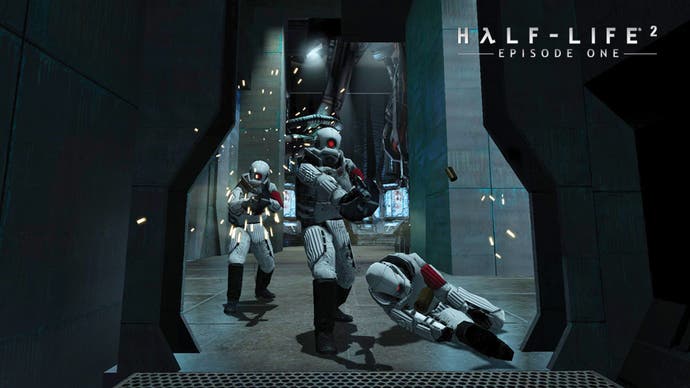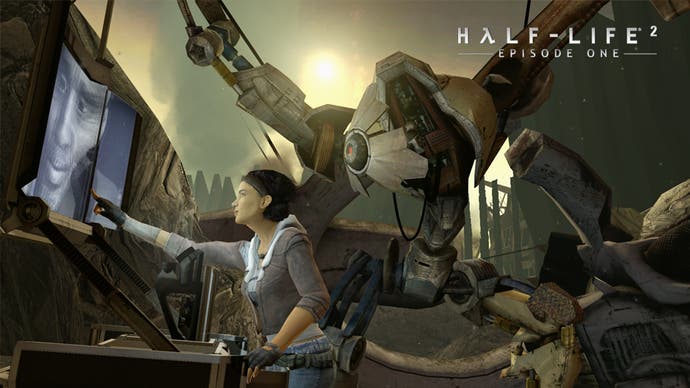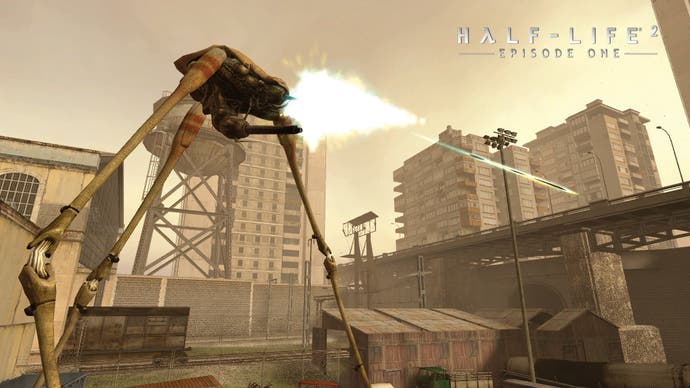Opening the Valve
Gabe Newell and co. on Hollywood, Episode One and future expansions.
After spectacularly 'raising the bar' (with a gravity gun) of the FPS genre in 2004, Valve last week turned its attention to extending the Half-Life 2 universe episodically with the release of the first in a trilogy of episodes that finally reveals what happened to Gordon and Alyx after the destruction of the Citadel.
Just prior to our playtest, the Bellevue-based developer opened its doors to Eurogamer for the first time last week, and gave us a fascinating account of how the first episode came into being, the potential for future Half-Life 2 'expansions' as well as giving us their thoughts on how much Hollywood's treatment of Half-Life 'sucks'.
Be sure to check our in-depth review for more on this excellent game, and come back later this week for more exclusive thoughts from one of the world's most respected development studios.
It's great... sure beats waiting six years.
Lost Coast pushed Episode One, and Day of Defeat [Source] took some cycles as well. Part of the reason to do things in smaller chunks is that it makes things more retractable, rather than slipping by huge gobs, you're sort of exponentially smaller if you're breaking things up.
Uptake across the board is pretty high. People are starting to like [Steam] as a method of getting things through regular orders and through pre-ordering as well.

The original Half-Life took us two years to develop. With a considerably larger team Half-Life 2 took us six years to develop, so we thought if we were going to continue our trend with Half-Life 3 we would basically ship after we had all retired.
We're trying to come up with a better way of getting more timely updates to our customers and also come up with something that didn't have the complexities. Projects increased logarithmically with how much we tried to do, so if you tried to put twice as much content or technology into a box it ends up taking you four times the amount of work, right, and so we're trying to figure out a better solution.
We left Half-Life 2 on a cliffhanger with the Citadel blowing up, Alyx is a couple of feet away from the explosion, so what's going to happen? People were pretty clear that they didn't want to have to wait as long as they had previously to find out what happened.
There are three that are in this arc. There are three that are worked out, and those are the ones that we've been talking about so far.
Errr... I... I think that Aftermath was almost a temporary name. I always thought of it as Episodes One through Three because that's how we planned the products out. I think people thought we'd need a name for them, and Aftermath ended up being more confusing than helpful.
Probably a better name for it would have been Half Life 3: Episode One, but these three are what we're doing as our way of taking the next step forward, but Half-Life 2 was the name we used.
But we can't change the name 24 hours before release [smiles].
No, but what I'm saying is this is what we're trying instead of the large monolithic release. Let's take what we would ordinarily do and break it up into three pieces and see.
A big focus is Alyx, both from a storytelling perspective and from a gameplay perspective. We really liked her as a character, and the fans did too, so we wanted you to be spending a long time with her, and seeing how far we could push this notion of single player co-op. Being in this world with someone who's operating pretty intelligently and acting more as an ally, rather than this dumb collection of polygons that sort of troops around and gets in your way.
The arc of the trio of episodes is also about the G-Man. He appears briefly in Episode One, and we'll get more info on him later. If you think of Half-Life 1 as the G-Man trying to turn you into something that was useful to him - the transformation of the player into hero. And then Half-Life 2 was about how he was using you. Half-Life 3 [a.k.a. Episodes One to Three] is about the relationship with the G-Man and what happens when he loses control of you, when you're not available to him as a tool and how he responds to that, and what are the consequences of that.
Alyx and the relationship with her is a big focus in Episode One and the larger story about your evolving relationship with the G-Man. That's the text of the trio of episodes.

Well, [Episodes One to Three] aren't expansion packs, right? [In Half-Life] we liked to continue to illuminate these events through different sets of eyes. With Decay we were pretty amused to see these two sets of women carrying the crystal to the test chamber or whether you're Adrian Shepherd [in Opposing Force] or Barney [in Blue Shift], so we liked that aspect to it.
We don't think of these as expansions. If we were to do expansion properties we'd go back and work out those various events. We see [Episode One] more as moving the story forward rather than what we do with expansion packs. I like the idea of expansion packs giving you a different perspective on things you've already lived through, but I think gamers are expecting more core products to move the technology forward, to move the story forward and move the gameplay forward.
Well, we might do with expansion products because there's a lot of fun stuff there to explore.
Yes, you'll be Gordon Freeman for all three of them. In sense, the core stuff, like Half-Life 2 and the Episodes you play as Gordon, and expansion products you tend to revisit issues and play as different people and see those events through their eyes. It's relatively unlikely that you'd play as one of these other characters as the main story is going forward. We'll save that for Gordon.
We've announced that we're doing development work on the engine for the 360, but key titles and whatnot are all speculation. I saw a cover for an official PlayStation magazine that said we'd announced a PlayStation 3 version - that was interesting! We see a lot of that stuff...
There are a couple of other things we're trying to do. The world's started to change, right? There was the world of Half-Life 1 which was the familiar turned strange. You were a scientist and you turned into a hero. With Half-Life 2 we spent a lot of time thinking about this post-Combine world, what happens to it, and looking at the Eastern European art direction; the sensibility of it was really adding to that.
With this [Episodic] trilogy we're trying to show it as more dangerous than it was before. This thing's sort of falling apart; there are more factions, more forces at work and we're going to get the player out of City 17. That's a great setting for what we're trying to do with Half-Life 2, especially with Episode 2 where we're getting you further and further away from that into more of the possibilities of the future, and away from the Eastern European, City 17 sensibilities.

Not yet! You'll see a teaser at the end that gives you a sense of what the environments will be like. Later this summer we'll give more details about Episode 2 - it's out by the end of this year, and three is by next year. Episode Two actually started simultaneously with Episode One. Robin Walker's heading up Episode One development, and David Spiros is heading up another team doing Episode Two.
Exactly. The reason to do that, in a sense is all about risk management, so you have these projects where somebody says "ok, we're going to do a $15m PS3 project" and right there you've just set fire to all of the risk you can possibly assume on the project. It's a huge financial risk, you've got a new platform with all sorts of scary architecture changes, so people aren't going to be particularly innovative on new technical purchases. They're not going to be innovative on gameplay, they'll go an license a movie IP, and then they're going to insist to the development team that they remove anything that makes it unlikely that they won't ship day and date with the marketing campaign for the movie, and that seems to be sort of the wrong direction to go in terms of moving games forward.
What we've been trying to do is think about what sort of strategy to follow, so if you look back at Half-Life 1, the things that we thought were important was this notion of immersive world and storytelling in the FPS genre and when you look at the aggressive support for mods and supporting the multiplayer community in Team Fortress and Counter-Strike we thought that there was a lot of value in having a direct relationship with our customer. So we worked on Steam, and that lets us do a lot of things, it lets us sell to our customers, communicate with them. Anytime one of our customers gets a crash anywhere in the world I get a report on my desk. We know exactly what hardware they're using.
So if we look at this risk issue and we say, "ok, if we keep building these bigger and bigger projects, the game designs, the technology, the willingness to explore new properties and so on is going to get more and more scrubbed out of the system. We did Lost Coast, and one of the things we did was say here's a project with a known setting, we can go and work on just getting High Dynamic Range rendering and we can try this commentary system. So if we can get it out there and get it debugged with all the driver issues worked through - and we're not trying to develop 15 things at the same time - we're just focusing on the one thing.
And the commentary system we can get it out to our customers and ask them 'what do you think?' and they tell us 'it's cool, we like it a bunch', so we go from 14 or 15 pieces of commentary to well over 100 in Episode One. It's this approach of trying to come up with a solution to how we can keep moving things forward, and we can incorporate a lot of feedback.
We looked at the technology we're trying to ship. When you're a game developer we think - and I'm sure you've seen this - there's a huge difference between technology which you demo and technology that you ship. If those two things counted we'd all have telepathy and levitation boots nowadays.
We've got a demo of it!
There's this big difference between a technology you can show in really limited circumstances and say "look how fancy this graphics effect is," or "look how fancy this physics thing is" - and two years later you still haven't shipped it. Thus, coming up with a mechanism to get this stuff all the way through QA, all the way through all the driver problems, you've got some high field representation, but how does that interact with your physics? When you're doing your demoing, you don't have to worry about it, but it turns out that 70 per cent of the work is getting all of these things to work together and not just getting them to work in isolation.








